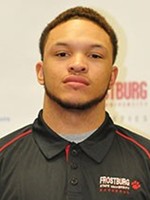Breaking the Silence: Starting the Gender Talk on Campus
My dearest readers:
Sexual assault in higher education institutions is a national problem; however, the ongoing Title IX investigation as well as recent reports have made it quite clear that this problem is not just something that happens to other people. Sexual assault is hitting close to home at Frostburg State University.
In fact, according to recent Bureau of Justice statistics, nearly one in four women will be sexually assaulted during their college career, and, of this staggering number, less than five percent are reported to law enforcement. The number of rapes is at an all-time high, but this is not due to increased promiscuity or access to alcohol: rape is not about sex. According to a recent report from the Dart Center for Journalism and Trauma, “Rape is violence, not ‘sex.'”
There are many misconceptions in society about the perpetration of this horrendous crime. Attempted or completed rape is never the fault of the victim. The Campus Save Act that was passed in 2013 redefined sexual assault as “any sexual intercourse without clear/knowing consent.” Every assault is different, and every reaction is different, but this does not mean that it should go unreported.
This is an unbelievably massive problem.
According to a report published on the United Educators website, the average span of time between an assault and the report is 11.3 months. After that length of time has passed it is very difficult to find concrete proof that will lead to a conviction. Conviction rates aside, spending nearly a full calendar year forcing yourself to deal with your traumatic experience alone can cause many lasting mental health problems.
This is why it’s time to speak up. Changes cannot be made by remaining silent.
Coming forward is never easy. In light of the statistic that nine in ten rape victims knew their attacker, many victims are mortified by the potential outcome. Some wish to protect the attacker, some avoid reporting the crime to protect their own dignity. As a victim it is important to remember that the occurrence was not your fault, and anyone who reacts to your brave report with anything less than support and sympathy is in the wrong. No exceptions. Do not let them blame you.
It is important to remember that if you have been subjected to this crime that you are a victim. This was not your fault, and it is your absolute right to seek justice and support from those around you. I know that it is not easy to come forward. It took me over a year to reveal my own experience to those closest to me. It feels embarrassing. I know that I personally was terrified that this happening made me weaker, but you can only let your attacker take your power if you let them.
I “came out” as a sexual assault victim in a Facebook post. “Fifty Shades of Grey” was set to be released, so there were a myriad of posts both damning and defending the books and movie. As an avid reader I had tried to read these books that everyone was gushing about, but my prior experience as a victim of gender based violence did not allow me to read these hurtful words with an open mind. After sharing a picture that demonstrated the problems with the story I was attacked by friends who had enjoyed the book. They didn’t understand how I could judge something so harshly if I had never completed the story. That is what prompted my reveal. The following is the Facebook post:
“I was sexually assaulted.
“He was a friend and a co-worker. He was pretty well known for being a womanizer, and at least two of my female friends and co-workers were caught in his web. He made each of them feel special. On the night before he was set to move across the country, he asked two of our coworkers to come help him pack. I came along because these two were very close friends. While the two of them were packing up the living room, I was putting CDs into a box in another room. He came in and told me that he had “wanted to get it in before [he] knew that I was underage and taken” and now that I was single and legal he wanted to ‘hit that.’
“I told him thank you for the underhanded compliment, but no, for so many different reasons. Later that evening we were all sitting around and I began to kiss one of the other girls. It was a mutual interest. He then forced himself behind me and kept saying he only wanted to “join in on the fun.” We told him no, and to leave. He persisted, insisting that we were leaving him out. He forced himself onto me and I had to push him away with all of the force I had.
“In this rape culture that society has created, I felt helpless. I actually believed that I should be happy that someone had wanted me so much that he forced it. But I wasn’t happy. I felt as though there were things that I could have done, but this was not my place to do something. It was his place not to touch me when I explicitly told him no numerous times. Consent is key.
“My attacker does not think there is anything wrong with his actions. The other girl who was involved moved across the country to the same town six months after he did to get closer to him. She knows what he did to me, and yet, she still follows him.
“I am not a survivor; I am a victim. You survive cancer, a terrible, yet unstoppable illness. You are a victim to a crime, which is exactly what rape and sexual assault are.
“This is my biggest problem with “Fifty Shades of Grey.” The popularity of this movie leads women to believe they should be submissive, and it leads men to believe that this is an aspiration. Men like Christian Grey and my attacker get what they want regardless of means. I tried to read the book (because I read most everything), and all I could feel in the pit of my stomach was the same discomfort I felt after my attack. If you choose to see the film, fine. Make your own decisions. I am simply letting you know that this is what it feels like from the stand point of the victims. It feels as though our experiences are undermined and our attackers glorified.”
Such begins my series on gender-based issues in the campus environment. Each week, I will be publishing a story relating to the various problems different genders in Frostburg face. Ranging from the wage gap evident in athletic coaches at the university to how the on-campus counseling center reacts and helps those who have fallen to victims of tremendous crimes, the goal of this investigative series is to tackle gender issues on campus.
Stand up. Speak out. Fight back.




1 Comment